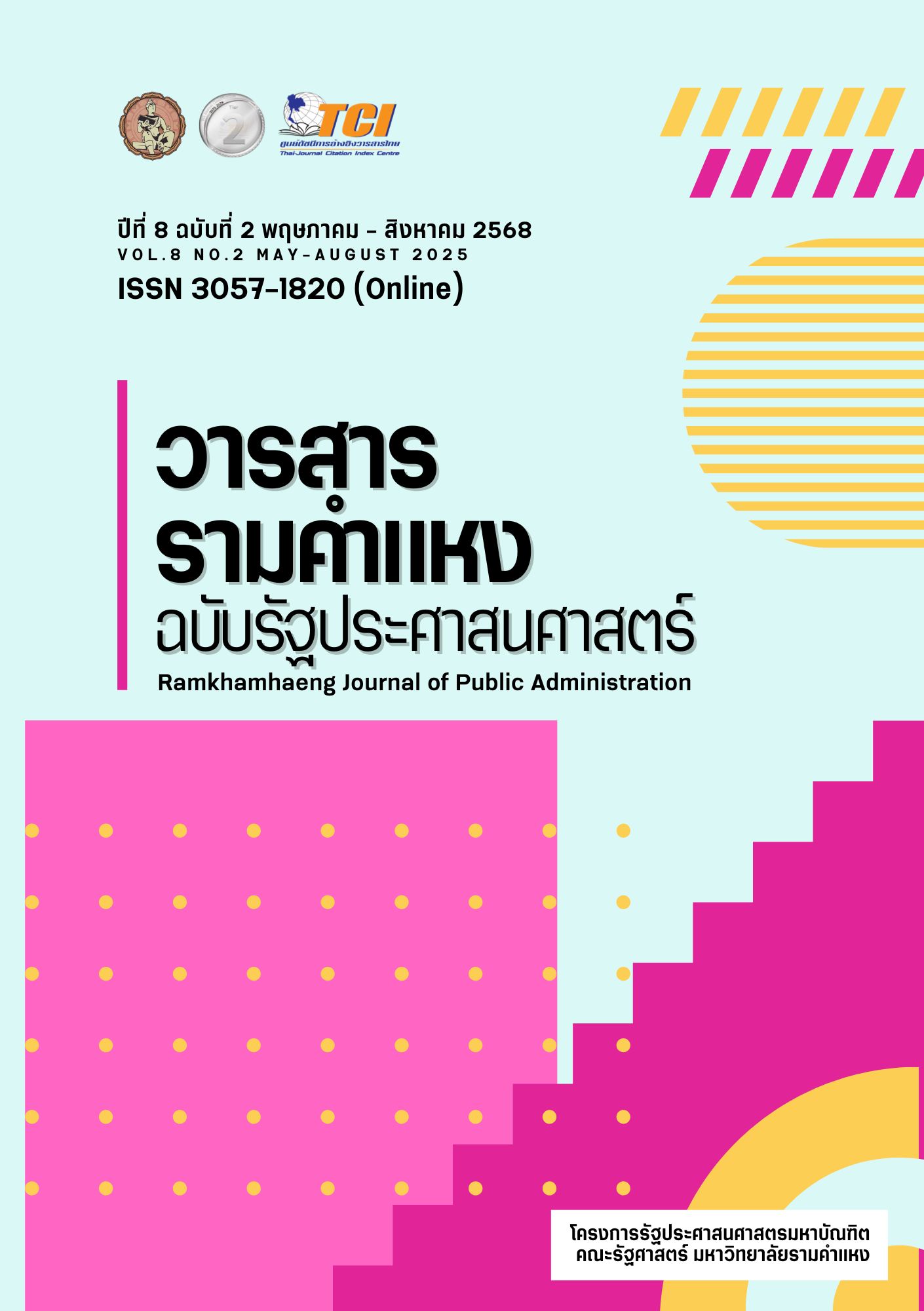Criticizing Thai society in a democratic digital age
Keywords:
Criticize, Digital Democracy, SocietyAbstract
This academic article aims to reflect the changing landscape of Thai society from past to present, grounded in the democratic system with the monarchy as its head of state. Increased access to digital devices and the internet has significantly influenced social transformations, necessitating adaptation to evolving human behaviors across all dimensions, particularly in the political realm. This has given rise to the concept of "Digital Democracy" - a form of political participation through information technology that operates at local, regional, national, and global levels. The term "digital" refers to numerical representation in information theory or data systems, serving as a method to represent data or works in numerical format, specifically in binary form. This approach differs fundamentally from analog systems that use continuous values or signals, or represent data through continuous functions. Most contemporary computers and technologies primarily operate through digital signal transmission, especially in information communication technologies. This era is consequently termed the "Digital Age," which can be categorized into distinct stages: Digital 1.0 (Internet Era), Digital 2.0 (Social Media Era), Digital 3.0 (Big Data Analytics/Cloud Computing/Application Era), and Digital 4.0 (Machine-to-Machine Era). Essentially, it represents an electronic era characterized by rapid communication technologies that enable swift transmission of knowledge existing within society - encompassing news, images, or videos that can be accessed quickly and universally, at any time and place. The author has integrated concepts and theories from social sciences, political sciences, and public administration to present perspectives on social changes through various historical periods and events. The objective is to demonstrate both
concrete and abstract values, reflecting impacts that are both supportive and potentially diminishing, while proposing strategies to maintain and adapt to changes in the technology-driven world, commonly referred to as the digital age.
References
เคนดรา เชอรรี่. (2566). การแบ่งขั้วของกลุ่มส่งผลต่อทัศนคติที่รุนแรงอย่างไร. สืบค้นเมื่อ 25 มี.ค.2568 จาก https://www.verywellmind.com/group-polarization-theories-and-examples-7547335
ชำนาญ จันทร์เรือง. (2565). วัฒนธรรมการวิพากษ์แบบไทยๆ. สืบค้นเมื่อ 8 ม.ค.2568 จาก https://prachatai.com/journal/2022/07/99625
ฉัตรพงศ์ ชูแสงนิล. (2562). ความฉลาดทางดิจิทัล (Digital intelligence). สืบค้นเมื่อ 13 ม.ค.2568 จาก
https://www.scimath.org/article-technology/item/10611-digital-intelligence
ปธาน สุวรรณมงคล. (2567). เสรีนิยม.ฐานข้อมูลการเมืองการปกครองสถาบันพระปกเกล้า. สืบค้นเมื่อ 21 มี.ค.2568 จาก http://wiki.kpi.ac.th/index.php?title=เสรีนิยม
ภันทิลา ประเสริฐสกุล. (2565). วิจารณ์ไม่ได้แปลว่าด่า: เหตุใดคนไทยจึงโกรธกันออนไลน์. สืบค้นเมื่อ 13 ม.ค.2568 จาก https://www.ricemedia.co/thailand/prabda-yoon-criticism-thai-society/
มติชนออนไลน์. (2561). วิพากษ์…สังคมไทยยุคเปลี่ยนผ่าน‘ปชต. สืบค้นเมื่อ 8 ม.ค.2568 จาก https://www.matichon.co.th/politics/news_1220214
มหาวิทยาลัยมหิดล. (2568). ภูมิคุ้มกันในโลกดิจิทัล (Digital Resilience)ทักษะที่เด็กและเยาวชนไทยยุคใหม่ต้องมี. สืบค้นเมื่อ 23 มี.ค.2568 จาก https://mahidol.ac.th/musef/ภูมิคุ้มกันในโลกดิจิทัล/#
เยฟเกนี โคห์ลอฟ. (2021). บทวิจารณ์ การผูกขาดโดยกลุ่มผูกขาด. สืบค้นเมื่อ 23 มี.ค.2568 จาก https://www.concurrences.com/en/dictionary/oligopoly
วารสารจุลนิติ. (2554). หลักสิทธิและเสรีภาพ ตามรัฐธรรมนูญแห่งราชอาณาจักรไทย : แนวความคิดและภาคปฏิบัติ. สืบค้นเมื่อ 25 มี.ค.2568 จากhttps://gistda.or.th /ewtadmin//ewt/gistda_ web/article_attach/articlefile_2021072215424920210.pdf
วิสุทธิ์ เวชวราภรณ์. (2567). ทฤษฎีสมคบคิดในมุมมองมานุษยวิทยา. สืบค้นเมื่อ 23 มี.ค.2568 จาก https://www.sac.or.th/portal/th/article/detail/605
วีระ เลิศสมพร. (2563). ประชาธิปไตยดิจิทัล. กรุงเทพฯ: หอสมุดรัฐสภา.
สมชัย เลิศสุทธิวงศ์. (2560). ประชาธิปไตยกับการสื่อสารยุคดิจิทัล. กรุงเทพฯ: วิทยาลัยศาลรัฐธรรมนูญ.
อรวรรณ เกษร. (2563). การมีส่วนร่วมทางการเมืองในระบอบประชาธิปไตยในยุคดิจิทัล. รัฐสภาสาร 68(6), 5-22.
อภิญญา ตั้งประสิทธิ์ศิลป์. (2562). ความน่าเชื่อถือของแหล่งข้อมูลข่าวสารบน เฟซบุ๊กที่มีผลต่อพฤติกรรมการส่งต่อข้อมูลข่าวสารของผู้ใช้สื่อสังคมในเขตกรุงเทพมหานคร. กรุงเทพฯ: มหาวิทยาลัยกรุงเทพ.
Barnett, C. and Low, M. (2004). Spaces of Democracy : Geographical Perspectives on Citizenship, Participation and Representation. First Edition. London: SAGE Publications Ltd.
Bildt, C. (2017). The digital age. Article: 1344030 | Published online: 25 Aug 2017. Retrieved 12 Jan. 2025. From https://doi.org/10.1080/16549716.2017.1344030
Keyes, C.F. (2015). Democracy Thwarted :The Crisis of Political Authority in Thailand. ISEAS Publishing. Retrieved 12 Jan 2025. From https://doi.org/10.1355/9789814695114
O'Callaghan, C. (2020). Post politics and Post-Truth International Encyclopedia of Human Geography (Second Edition). https://doi.org/10.1016/B978-0-08-102295-5.10683-3
Thorn Pitidol. (2016). Redefining Democratic Discourse in Thailand’s Civil Society. Retrieved 12 Jan 2025. From https://doi.org/10.1080/00472336.2016.1164229
van den Hoven, J. (2024). Democracy in the Digital Age. Retrieved 23 March 2025. From https://shs.hal.science/halshs-04844505v1
Wikipedia. (2009). Royalist. Retrieved 23 March 2025.From https://en.wikipedia.org/wiki/Royalist
Downloads
Published
How to Cite
License
Copyright (c) 2025 วีรชาติ ภักดี

This work is licensed under a Creative Commons Attribution-NonCommercial-NoDerivatives 4.0 International License.



